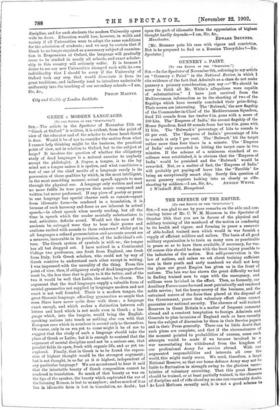GREEK v. MODERN LANGUAGES.
[TO THE EDITOR OF TIE "SPECTATOR.1
SIR,— The article in the Spectator of November 15th on " Greek at Oxford" is written, it is evident, from the point of view of the educator and of the scholar to whose heart Greek is dear. Would it be of use to consider the matter• from what I cannot help thinking might be the business, the practical point of view, not in relation to Oxford, but to the subject at large? It involves the question of whether the obligatory study of dead languages is a natural exercise to anybody except the philologist. A lingua, a tongue, is to the lay mind not a tongue unless it is spoken, and what constitutes a test of one of the chief merits of a language surely is its possession of those qualities by which, in the most intelligent, in the most ennobling manner•, actual speech appeals to man through the physical ear. A language only written and read no more fulfils its true purpose than music composed and written but never performed. If any piece of poetry or prose in one language has special charms such as cannot—apart from idiomatic form—be rendered in a translation, it is because of such harmony and force as are inherent in actual speech,—in silent speech when merely reading, but all the time in speech which the reader mentally substantiates in real, articulate, definite sound. Would not the ears of the ancients be outraged were they to hear their poems and orations recited with sounds to them unknown ? whilst yet in all languages a refined pronunciation and accurate accent are a measure, inexorable in its precision, of the individual's cul- ture. The Greek system of symbols is with us ; the tongue has all but dropped out. I have noticed in a Continental College two professors, one fresh from England, one fresh from Italy, both Greek scholars, who could not by way of Greek contrive to understand each other except in writing. I was impressed with the unreality of the thing. From this point of view, then, if obligatory study of dead languages there must be, the less time that is given to it the better, and of the two it would be well that Latin, the easier, be chosen. The argument that the dead languages supply a valuable form of mental gymnastics not supplied by languages modern and not exact is not well founded. There is a modern tongue, the great Slavonic language, affording gymnastics so ample that even Slays have never quite done with them ; a language exact enough, and which makes a distinction between soft letters and hard which is not made even in Greek ; a lan- guage which, into the bargain, would bring the English- speaking nations into touch as nothing else can with that European race which in numbers is second only to themselves. Of course, only in an era yet to come might it be of use to suggest that the study of such a language should take the place of Greek or Latin; but it is enough to contend that the argument of mental discipline need not be a serious one, that parallel fields lie open, fresh with organic life, and as yet un- explored. Finally, that in Greek is to be found the expres- sion of highest thought would be the strongest argument; but is not thought, in so far as it is highest, independent of any particular language? We are accustomed to hear it said that the inimitable beauty of Greek composition cannot be rendered in translation. So much of that beauty as was on the lips of the speaker•, the beauty which captivated the ear of the listening Roman, is lost to us anyhow; and so much of it as lies in idiomatic form is lost in translation, no doubt: but upon the garb of idiomatic form the appreciation of highest thought hardly depends.—I am, Sir, &c.,
[Mr. Brunner puts his case with vigour and conviction. But is he prepared to find us a Russian Thucydides ?—ED, Spectator.]










































 Previous page
Previous page